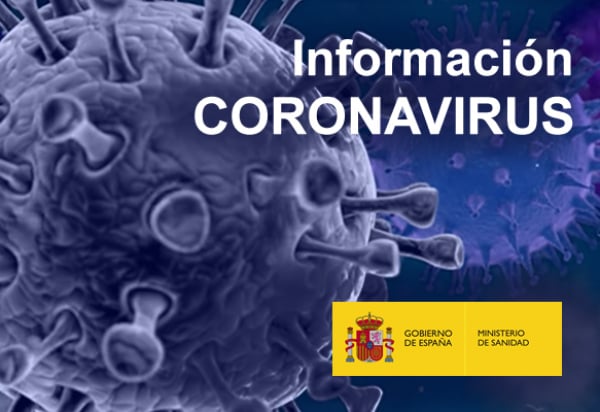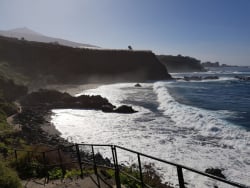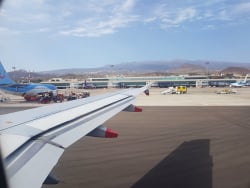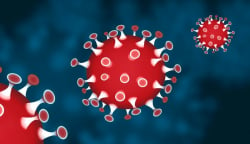Below we have translated into English the entire Royal Decree 463/2020, of March 14, declaring the state of alarm for the management of the health crisis situation caused by COVID-19. Of particular interest to those in or planning to travel to Tenerife in the near future is Article 10 and the Annex at the bottom of the post, these state clearly the situation regarding tourist type facilities include bars, restaurants, cafes, tourist attractions etc. They are all closed for at least 15 days from 15th March 2020.
There is up to date information on our website on the current state of the situation regarding COVID-19 Coronavirus on Tenerife.
Royal Decree 463/2020 State of Alarm March 14 2020 COVID-19
On March 11, 2020, the World Health Organization elevated the public health emergency situation caused by COVID-19 to an international pandemic. The rapid evolution of events, at the national and international levels, requires the adoption of immediate and effective measures to face this situation. The extraordinary circumstances that arise constitute, without a doubt, an unprecedented health crisis and of enormous magnitude, both due to the very high number of citizens affected and the extraordinary risk to their rights.
Article four, section b) of Organic Law 4/1981, of June 1, on the states of alarm, exception and siege, empowers the Government to, in the exercise of the powers attributed to it by article 116.2 of the Constitution, to declare a state of alarm, in all or part of the national territory, when sanitary crises occur that suppose serious alterations of normality.
Within this framework, the measures provided for in this regulation are part of the Government's decisive action to protect the health and safety of citizens, contain the progression of the disease and strengthen the public health system. The extraordinary temporary measures that have already been taken by all levels of government must now be stepped up without delay to prevent and contain the virus and mitigate the health, social and economic impact.
In order to face this serious and exceptional situation, it is essential to proceed to the declaration of the state of alarm.
The measures contained in this royal decree are essential to deal with the situation, are proportionate to the extreme seriousness of it and do not imply the suspension of any fundamental right, as provided for in article 55 of the Constitution.
By virtue of this, at the proposal of the First Vice President of the Government and Minister of the Presidency, Relations with the Courts and Democratic Memory, the Minister of Health, the Minister of Defense, and the Ministers of the Interior, and of Transport, Mobility and Urban Agenda, and after deliberation by the Council of Ministers at its meeting on March 14, 2020.
Article 1. Declaration of the alarm status.
Under the provisions of article fourth, sections b) and d), of Organic Law 4/1981, of June 1, on the states of alarm, exception and siege, the state of alarm is declared in order to face the health emergency situation caused by the coronavirus COVID-19.
Article 2. Territorial scope.
The declaration of the state of alarm affects the entire national territory.
Article 3. Duration.
The duration of the state of alarm that is declared by this royal decree is fifteen calendar days.
Article 4. Competent authority.
1. For the purposes of the state of alarm, the competent authority will be the Government.
2. For the exercise of the functions referred to in this royal decree, under the highest direction of the Prime Minister, will be delegated competent authorities, in their respective areas of responsibility:
b) The Minister of the Interior.
c) The Minister of Transport, Mobility and Urban Agenda.
d) The Minister of Health. Likewise, in areas of responsibility that do not fall within the competence of any of the Ministers indicated in paragraphs a), b) or c), the Minister of Health shall be the delegated competent authority.
3. The Ministers designated as the competent authorities delegated in this royal decree are empowered to issue the orders, resolutions, provisions and interpretive instructions that, in the specific sphere of their action, are necessary to guarantee the provision of all services, ordinary or extraordinary. , in order to protect people, property and places, by adopting any of the measures provided for in article eleven of Organic Law 4/1981, of June 1. The acts, provisions and measures referred to in the preceding paragraph may be adopted ex officio or at the motivated request of the competent regional and local authorities, in accordance with the applicable legislation in each case and must pay attention to vulnerable people. For this, the administrative procedure will not be necessary.
4. During the validity of the state of alarm, the Situation Committee provided for in the first additional provision of Law 36/2015, of September 28, on National Security, is activated as an organ to support the Government in its capacity as competent authority. Article 5. Collaboration with the delegated competent authorities.
1. The members of the State Security Forces and Bodies, the Police Bodies of the autonomous communities and local corporations will be under the direct orders of the Minister of the Interior, for the purposes of this royal decree, as necessary to the protection of people, goods and places, being able to impose extraordinary services for their duration or their nature.
2. The agents of the authority will be able to carry out the checks on people, goods, vehicles, premises and establishments that are necessary to check and, where appropriate, prevent the services and activities suspended in this royal decree from taking place, except those expressly excepted. To do this, they may issue the necessary orders and prohibitions and suspend the activities or services that are being carried out. To this end, citizens have the duty to collaborate and not hinder the work of the agents of authority in the exercise of their functions.
3. In those autonomous communities that have their own police forces, the Monitoring and Coordination Commissions established in the respective Security Boards will establish the necessary mechanisms to ensure what is stated in the two previous sections.
4. The intervention services and assistance in civil protection emergencies defined in article 17 of Law 17/2015, of July 9, of the National Civil Protection System, will act under the functional dependency of the Minister of the Interior.
5. The Minister of the Interior may issue the orders, resolutions, provisions and instructions that he considers necessary to all the subjects included in the scope of application of Law 5/2014, of April 4, on Private Security.
6. For the effective compliance of the measures included in this royal decree, the competent delegated authorities may require the action of the Armed Forces, in accordance with the provisions of article 15.3 of Organic Law 5/2005, of November 17 , of the National Defense.
Article 6. Ordinary management of services.
Each Administration will retain the powers granted by the current legislation in the ordinary management of its services to adopt the measures it deems necessary within the framework of the direct orders of the competent authority for the purposes of the state of alarm and without prejudice to the provisions of articles 4 and 5. Article 7. Limitation of the freedom of movement of people.
1. During the validity of the state of alarm, people may only circulate along the roads for public use to carry out the following activities:
a) Acquisition of food, pharmaceuticals and basic necessities.
b) Assistance to health centers, services and establishments.
c) Travel to the workplace to carry out their labor, professional or business provision.
d) Return to the place of habitual residence.
e) Assistance and care for the elderly, minors, dependents, people with disabilities or especially vulnerable people.
f) Displacement to financial and insurance entities.
g) Due to force majeure or need.
h) Any other activity of a similar nature that must be done individually, unless accompanied by people with disabilities or for other justified cause.
2. Likewise, private vehicles will be allowed to circulate along public use roads to carry out the activities referred to in the previous section or to refuel at gas stations or service stations.
3. In any case, in any displacement the recommendations and obligations dictated by the health authorities must be respected.
4. The Minister of the Interior may decide to close the circulation of roads or sections of them for reasons of public health, traffic safety or fluidity or the restriction in them of the access of certain vehicles for the same reasons. When the measures referred to in the preceding paragraphs are adopted ex officio, the regional administrations that exercise powers to execute the State legislation on traffic, vehicle circulation and road safety will be previously informed. The state, regional and local authorities competent in matters of traffic, vehicle circulation and road safety will guarantee the dissemination among the population of measures that may affect road traffic.
Article 8. Temporary requirements and compulsory personal benefits.
1. In accordance with the provisions of article eleven b) of Organic Law 4/1981, of June 1, the delegated competent authorities may agree, ex officio or at the request of the autonomous communities or local entities, that they be practiced Temporary requisitions of all kinds of goods necessary for the fulfillment of the purposes set forth in this royal decree, in particular for the provision of security services or critical and essential operators. When the requisition is agreed ex officio, the corresponding regional or local Administration will be previously informed.
2. In the same terms, the performance of mandatory personal benefits essential for the achievement of the purposes of this royal decree may be imposed.
Article 9. Containment measures in the educational and training field.
1. Face-to-face educational activity is suspended in all centers and stages, cycles, degrees, courses and levels of education contemplated in article 3 of Organic Law 2/2006, of May 3, on Education, including university education, as well as any other educational or training activities taught in other public or private centers.
2. During the suspension period, educational activities will be maintained through distance and online modalities, whenever possible.
Article 10. Containment measures in the field of commercial activity, cultural facilities, recreational establishments and activities, hotel and restaurant activities, and other additional activities.
1. The opening to the public of retail establishments and establishments is suspended, with the exception of retail commercial establishments for food, beverages, products and basic necessities, pharmaceutical establishments, medical, optical and orthopedic products, hygienic products, hairdressing salons, newspapers. and stationery, automotive fuel, tobacconists, technological and telecommunications equipment, pet food, internet commerce, telephone or correspondence, dry cleaners and laundries. Any other activity or establishment that in the opinion of the competent authority may pose a risk of contagion is suspended.
2. The permanence in commercial establishments whose opening is allowed must be strictly necessary so that consumers can purchase food and basic necessities, the possibility of consuming products in the establishments themselves being suspended. In any case, crowds will be avoided and consumers and employees will be controlled to maintain the safety distance of at least one meter in order to avoid possible contagion.
3. The opening to the public of the museums, archives, libraries, monuments, as well as of the premises and establishments in which public shows take place, the sports and leisure activities indicated in the annex to this royal decree are suspended.
4. Hotel and restaurant activities are suspended, and home delivery services can be exclusively provided.
5. Verbenas, parades and popular festivals are also suspended.
Article 11. Containment measures in relation to places of worship and with civil and religious ceremonies.
Attendance at places of worship and civil and religious ceremonies, including funerals, are conditional on the adoption of organizational measures consisting of avoiding crowds of people, depending on the dimensions and characteristics of the places, in such a way as to guarantee attendees the possibility of respecting the distance between them of at least one meter.
Article 12. Measures aimed at strengthening the National Health System throughout the national territory.
1. All the civil sanitary authorities of the public administrations of the national territory, as well as the other officials and workers at their service, will be under the direct orders of the Minister of Health as necessary for the protection of people, property and places. , being able to impose extraordinary services for their duration or their nature.
2. Notwithstanding the foregoing, the regional and local public administrations will maintain the management, within their sphere of competence, of the corresponding health services, ensuring their proper functioning at all times. The Minister of Health reserves the exercise of all the powers that are necessary to guarantee cohesion and equity in the provision of said service.
3. In particular, the full disposition of the civil authorities responsible for the field of public health, and of the employees who provide services in it, will be ensured.
4. These measures will also guarantee the possibility of determining the best distribution in the territory of all technical and personal resources, in accordance with the needs that become apparent in the management of this health crisis.
5. The competent delegated authorities shall exercise their powers to ensure that personnel and military health centers and establishments contribute to strengthening the National Health System throughout the national territory.
6. Likewise, the Minister of Health may exercise those powers that are necessary for these purposes with respect to privately owned health centers, services and establishments.
Article 13. Measures to ensure the supply of goods and services necessary for the protection of public health.
The Minister of Health may:
a) Issue the necessary orders to ensure the supply of the market and the operation of the services of the production centers affected by the shortage of products necessary for the protection of public health.
b) Intervene and temporarily occupy industries, factories, workshops, farms or premises of any nature, including privately owned health centers, services and establishments, as well as those that carry out their activity in the pharmaceutical sector.
c) Practice temporary searches of all kinds of goods and impose mandatory personal benefits in those cases where it is necessary for the adequate protection of public health, in the context of this health crisis.
Article 14. Transport measures.
1. In relation to all means of transport, whatever the competent Administration may be, the following shall apply:
a) The Minister of Transport, Mobility and Urban Agenda is empowered to dictate the acts and provisions that, in the specific sphere of his action, are necessary to establish conditions for the mobility services, ordinary or extraordinary, in order to protect people, goods and places.
b) The acts, provisions and measures referred to in paragraph a) above may be adopted ex officio or at the motivated request of the competent regional and local authorities, in accordance with the applicable legislation in each case. This will not require the processing of any administrative procedure.
2. Likewise, the following measures applicable to internal transport are adopted:
a) In public road, rail, air and sea passenger transport services that are not subject to a public contract or public service obligations (OSP), transport operators will reduce the total supply of operations by at least one fifty %. By resolution of the Minister of Transport, Mobility and Urban Agenda, this percentage may be modified and specific conditions may be established.
b) State-owned public passenger, road, rail, air and sea transportation services that are subject to public contract or OSP will reduce their total offer of operations by at least the following percentages: i. Medium distance rail services: 50%. ii. Medium-distance railway services-AVANT: 50%. iii. Regular road passenger transport services: 50%. iv. Air transport services subject to OSP: 50%. v. Maritime transport services subject to a navigation contract: 50%. Commuter rail services will maintain their range of services. By resolution of the Minister of Transport, Mobility and Urban Agenda, the reduction percentages of the services referred to above may be modified and specific conditions may be established in this regard. This resolution will take into account the need to ensure that citizens can access their jobs and basic services if necessary.
c) Public transport services for road, rail and maritime passengers of regional or local competence that are subject to a public contract or OSP, or are publicly owned, will maintain their transport offer. The Minister of Transport, Mobility and Urban Agenda and the regional and local authorities with powers in the field of transport may establish a percentage reduction in services in case the health situation so advises, as well as other specific conditions for the provision of the same. In adopting these measures, the need to ensure that citizens can access their jobs and basic services if necessary is taken into account.
d) Without prejudice to the provisions of paragraphs a), b) and c), specific criteria shall be established for transport between the Peninsula and non-peninsular territories, as well as for transport between islands.
e) In relation to all means of transport, operators of passenger transport services are obliged to carry out daily cleaning of transport vehicles, in accordance with the recommendations established by the Ministry of Health.
f) Online ticket sales systems must include, during the ticket sale process, a sufficiently visible message advising against traveling except for reasons that cannot be postponed. By order of the Minister of Transport, Mobility and Urban Agenda, the characteristics and content of this announcement may be established.
g) In those services in which the ticket grants a seat or cabin, the transport operators will take the necessary measures to ensure the maximum possible separation between passengers.
3. Transport operators will carry out the necessary adjustments to comply with the percentages established in this article as homogeneously as possible among the different services they provide and may ask the Ministry of Transport, Mobility and the Urban Agenda for any questions that require interpretation. or clarification. If for technical or operational reasons the direct application of the percentages established from the first day is not feasible, the quickest possible adjustment of the services should be carried out, which may not last more than five days.
4. By resolution of the Minister of Transport, Mobility and Urban Agenda, the necessary conditions will be established to facilitate the transport of goods throughout the national territory, in order to guarantee supply.
5. The delegated competent authorities may adopt all additional measures necessary to limit the circulation of collective means of transport that are necessary and proportionate to preserve public health.
Article 15. Measures to guarantee food supply.
1. The delegated competent authorities shall take the necessary measures to ensure:
a) The food supply in the places of consumption and the operation of the services of the production centers, allowing the distribution of food from the origin to the commercial establishments for sale to the consumer, including warehouses, logistics centers and destination markets. In particular, when it is necessary for security reasons, the accompaniment of the vehicles that carry the mentioned goods may be agreed.
b) When necessary, the establishment of sanitary corridors to allow the entry and exit of people, raw materials and processed products destined for or coming from establishments where food is produced, including farms, markets, animal feed factories and slaughterhouses.
2. Likewise, the competent authorities may agree on the intervention of companies or services, as well as the mobilization of the State Security Forces and Bodies and the Armed Forces in order to ensure the proper functioning of the provisions of this article.
Article 16. Customs transit.
The delegated competent authorities shall adopt the necessary measures to guarantee customs transit at the points of entry or border inspection points located in ports or airports. In this regard, priority products will be addressed. Article 17. Guarantee of supply of electrical energy, products derived from petroleum and natural gas. The delegated competent authorities may adopt the necessary measures to guarantee the supply of electrical energy, petroleum products, as well as natural gas, in accordance with the provisions of article 7 of Law 24/2013, of December 26, of the Electricity Sector, and in articles 49 and 101 of Law 34/1998, of October 7, on the hydrocarbon sector. Article 18. Critical operators of essential services.
1. The critical operators of essential services provided for in Law 8/2011, of April 28, which establishes measures for the protection of critical infrastructures, shall adopt the necessary measures to ensure the provision of essential services that are their own.
2. Said requirement will also be adopted by those companies and suppliers that, not having the consideration of critics, are essential to ensure the supply of the population and the essential services themselves.
Article 19. Means of communication of public and private ownership.
The public and private-owned social media are obliged to insert messages, announcements and communications that the competent delegated authorities, as well as the regional and local administrations, deem necessary to issue.
Article 20. Penalty regime.
Failure to comply or resistance to the orders of the competent authorities in the state of alarm will be punished in accordance with the laws, in the terms established in article ten of Organic Law 4/1981, of June 1.
First additional provision.
Foreign personnel accredited as a member of diplomatic missions. Foreign personnel accredited as a member of diplomatic missions, consular offices and international organizations located in Spain, both for travel within the national territory, to their country of origin or to third States, in the that it is equally accredited, provided that these are displacements linked to the performance of official functions.
Second additional provision.
Suspension of procedural deadlines.
1. Terms are suspended and the periods provided for in procedural laws are suspended and interrupted for all jurisdictional orders. The computation of the terms will be resumed at the moment the present royal decree or, where appropriate, its extensions, ceases to be in force.
2. In the criminal jurisdictional order, suspension and interruption shall not apply to habeas corpus procedures, to the actions entrusted to the guard services, to actions with detainees, to protection orders, to urgent actions in matters of prison surveillance and any precautionary measures regarding violence against women or minors. Likewise, in the investigation phase, the competent judge or court may agree to the practice of those actions that, due to their urgent nature, cannot be postponed.
3. In relation to the rest of the jurisdictional orders, the interruption referred to in the first section shall not apply to the following cases:
a) The procedure for the protection of the fundamental rights of the person provided for in articles 114 and following of Law 29/1998, of July 13, regulating the Contentious-Administrative Jurisdiction, or the processing of authorizations or ratifications judicial provisions in article 8.6 of the aforementioned law.
b) The procedures for collective conflict and for the protection of fundamental rights and public liberties regulated in Law 36/2011, of October 10, regulating social jurisdiction.
c) The judicial authorization for non-voluntary internment due to a mental disorder provided for in article 763 of Law 1/2000, of January 7, on Civil Procedure.
d) The adoption of measures or provisions for the protection of minors provided for in article 158 of the Civil Code.
4. Notwithstanding the provisions of the preceding paragraphs, the judge or court may agree to the practice of any judicial actions that are necessary to avoid irreparable damage to the legitimate rights and interests of the parties in the process. Third additional provision. Suspension of administrative deadlines.
1. Terms are suspended and deadlines are interrupted for processing procedures of public sector entities. The computation of the terms will be resumed at the moment the present royal decree or, where appropriate, its extensions, ceases to be in force.
2. The suspension of terms and the interruption of deadlines will apply to the entire public sector defined in Law 39/2015, of October 1, on the Common Administrative Procedure of Public Administrations.
3. Notwithstanding the foregoing, the competent body may agree, by means of a reasoned resolution, the management and instruction measures strictly necessary to avoid serious damage to the rights and interests of the interested party in the procedure and provided that the latter expresses its agreement, or when the interested party expresses its agreement that the term is not suspended.
4. This provision shall not affect the procedures and resolutions referred to in the first section, when they are referred to situations closely related to the facts justifying the state of alarm.
Fourth additional provision.
Suspension of prescription periods and expiration. The statute of limitations and expiration of any actions and rights will be suspended during the term of the state of alarm and, where appropriate, of the extensions that are adopted.
Fifth additional provision. Character of agent of the authority of the members of the Armed Forces. In accordance with the third additional provision of Law 39/2007, of November 19, on the Military Career, in relation to articles 15.3 and 16 e) of Organic Law 5/2005, of November 17, on Defense National, the members of the Armed Forces in the exercise of the functions provided for in this royal decree shall be agents of the authority.
First final provision. Ratification of the measures adopted by the competent authorities of the Public Administrations.
1. All the provisions and measures previously adopted by the competent authorities of the autonomous communities and local entities on the occasion of the COVID-19 coronavirus are ratified, which will continue in force and will produce the effects envisaged in them, provided they are compatible with this real decree.
2. The ratification contemplated in this provision is understood without prejudice to the judicial ratification provided for in article 8.6.2.º of Law 29/1998, of July 13. Second final provision.
Qualification. During the validity of the state of alarm declared by this royal decree, the Government may issue successive decrees that modify or extend the measures established therein, of which it shall report to the Congress of Deputies in accordance with the provisions of article eight. two of the Organic Law 4/1981, of June 1.
Third final provision. Entry into force. This royal decree shall enter into force at the time of its publication in the "Official State Gazette". Given in Madrid, on March 14, 2020.
FELIPE R.
The First Vice President of the Government and Minister of the Presidency,
Relations with the Courts and Democratic Memory,
CARMEN CALVO POYATO
ANNEX
List of facilities and activities whose opening to the public is suspended in accordance with the provisions of article 10.3
Records.
Libraries.
Monuments.
Public shows.
Leisure and fun:
Coffee-show.
Circuses.
Exhibition venues.
Party rooms.
Restaurant-show.
Other premises or facilities similar to those mentioned.
Cultural and artistic:
Auditoriums.
Movie theaters.
Squares, venues and bullfighting facilities.
Other venues and facilities:
Congress Pavilions.
Concert halls.
Conference rooms.
Exposition halls.
Multipurpose rooms.
Theaters
Sports:
Premises or closed rooms.
Soccer, rugby, baseball and similar fields.
Basketball, handball, volleyball and similar fields.
Clay pigeon shooting ranges, and assimilable.
Shooting galleries.
Tennis courts and assimilable.
Skating rinks, ice hockey, skates and the like.
Swimming pools.
Boxing, wrestling, judo and similar venues.
Permanent circuits of motorcycles, automobiles and the like.
Velodromes.
Racetracks, dog tracks and the like.
Pediments, ratchets, squash courts and the like.
Sports centers.
Bowling alleys and assimilable.
Billiards and assimilable rooms.
Gyms.
Running tracks.
Stadiums.
Other premises, facilities or activities similar to those mentioned.
Open spaces and public roads:
Pedestrian race routes.
Cycling, motorcyclist, automobile and similar test routes.
Motocross, trial and similar routes.
Nautical tests and exhibitions.
Aeronautical tests and exhibitions.
Other premises, facilities or activities similar to those mentioned.
Recreational activities:
Of dance:
Discotheques and dance halls.
Youth rooms.
Sports-recreational:
Premises or venues, without spectators, intended for sports-recreational practice for public use, in any of its modalities.
Games and bets:
Casinos
Establishments of collective games of money and chance.
Game rooms.
Recreational rooms.
Raffles and tombolas.
Other premises and facilities that can be assimilated to those of recreational activity for Games and betting in accordance with the provisions of the sectorial regulations on gaming.
Specific betting locations.
Cultural and leisure:
Amusement parks, fairs and the like.
Waterparks.
Fair booths.
Zoological parks.
Children's recreational parks.
Open spaces and public roads:
Verbenas, parades and popular parties or folkloric manifestations.
Leisure and fun:
Special bars:
Cocktail bars without live music performances.
Cocktail bars with live musical performances.
Hospitality and restoration:
Taverns and cellars.
Cafeterias, bars, cafe-bars and the like.
Chocolatiers, ice cream parlors, tea rooms, croissants and assimilates.
Restaurants, self-service restaurants and the like.
Bars-restaurant.
Hotel bars and restaurants, except to serve their guests.
Banquet halls.
Terraces.






